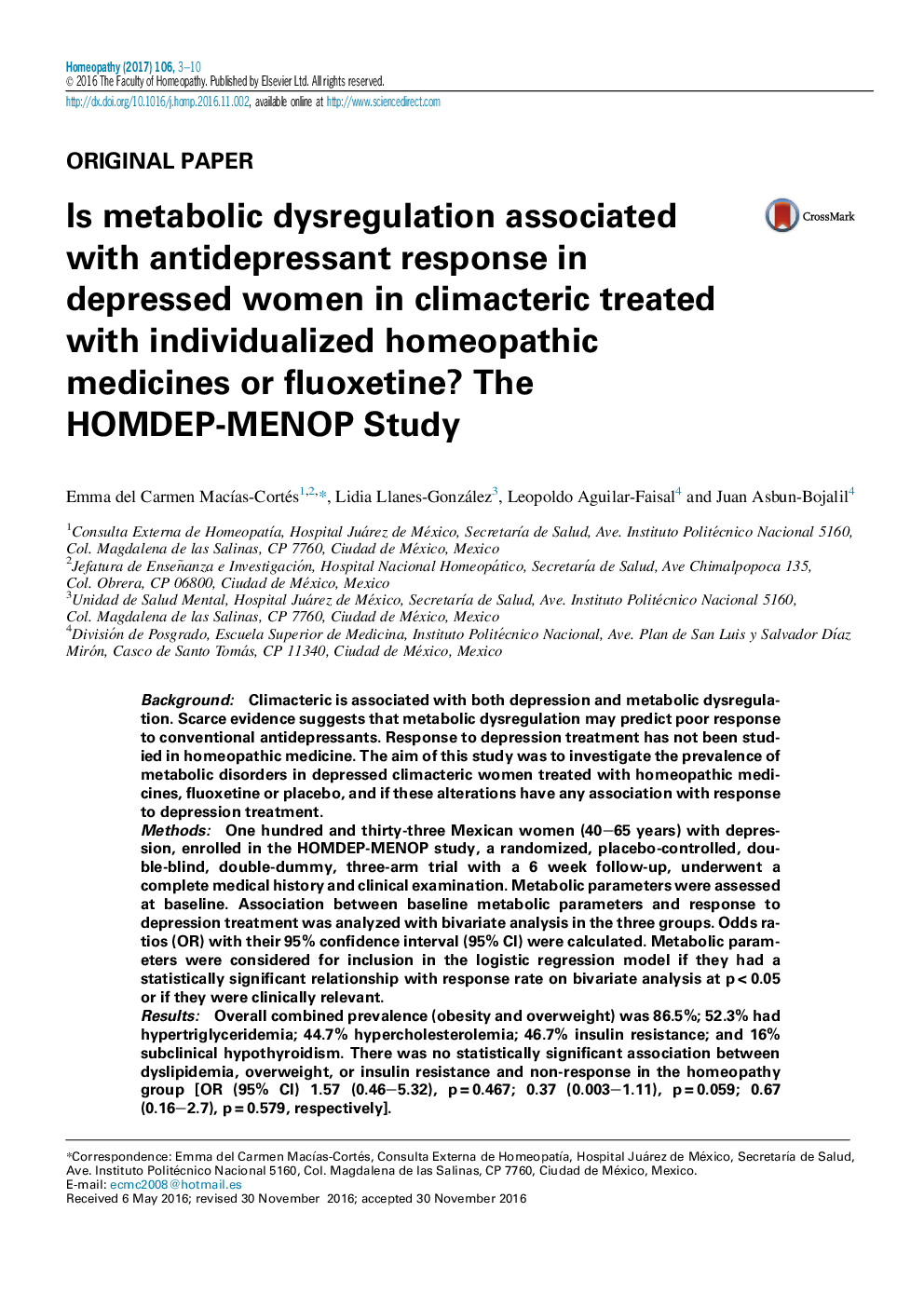| کد مقاله | کد نشریه | سال انتشار | مقاله انگلیسی | نسخه تمام متن |
|---|---|---|---|---|
| 5565279 | 1403550 | 2017 | 8 صفحه PDF | دانلود رایگان |
- Climacteric is associated with both depression and metabolic dysregulation.
- Few studies in homeopathy have investigated metabolic dysregulation, depression and climacteric.
- Association of response to depression treatment with homeopathic medicines and metabolic disorders was investigated.
- Metabolic disorders were not associated with response to depression treatment treated with homeopathy or fluoxetine.
- Future research should focus on homeopathy in climacteric women with depression and metabolic dysregulation.
BackgroundClimacteric is associated with both depression and metabolic dysregulation. Scarce evidence suggests that metabolic dysregulation may predict poor response to conventional antidepressants. Response to depression treatment has not been studied in homeopathic medicine. The aim of this study was to investigate the prevalence of metabolic disorders in depressed climacteric women treated with homeopathic medicines, fluoxetine or placebo, and if these alterations have any association with response to depression treatment.MethodsOne hundred and thirty-three Mexican women (40-65 years) with depression, enrolled in the HOMDEP-MENOP study, a randomized, placebo-controlled, double-blind, double-dummy, three-arm trial with a 6 week follow-up, underwent a complete medical history and clinical examination. Metabolic parameters were assessed at baseline. Association between baseline metabolic parameters and response to depression treatment was analyzed with bivariate analysis in the three groups. Odds ratios (OR) with their 95% confidence interval (95% CI) were calculated. Metabolic parameters were considered for inclusion in the logistic regression model if they had a statistically significant relationship with response rate on bivariate analysis at p < 0.05 or if they were clinically relevant.ResultsOverall combined prevalence (obesity and overweight) was 86.5%; 52.3% had hypertriglyceridemia; 44.7% hypercholesterolemia; 46.7% insulin resistance; and 16% subclinical hypothyroidism. There was no statistically significant association between dyslipidemia, overweight, or insulin resistance and non-response in the homeopathy group [OR (95% CI) 1.57 (0.46-5.32), p = 0.467; 0.37 (0.003-1.11), p = 0.059; 0.67 (0.16-2.7), p = 0.579, respectively].ConclusionMetabolic dysregulation was not significantly associated with response to depression treatment in depressed climacteric women treated with individualized homeopathic treatment (IHT), fluoxetine or placebo. Due to the high prevalence of metabolic disorders and its relationship with depression in the climacteric, further investigation should be focused on whether individualized prescriptions based on classical homeopathy for depressed climacteric women have an effect on metabolic parameters, and/or if treating the metabolic disorders at the same time could lead to higher response rates.ClinicalTrials.gov Identifier: NCT01635218URL: http://clinicaltrials.gov/ct2/show/NCT01635218?term=depression+homeopathy&rank=1
Journal: Homeopathy - Volume 106, Issue 1, February 2017, Pages 3-10
